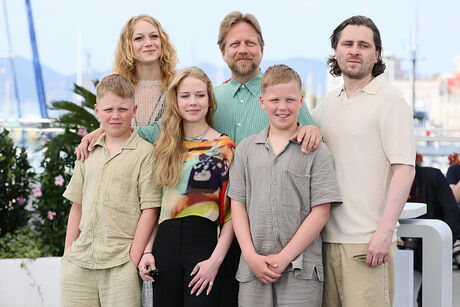Warm reception at Cannes for The Love That Remains
Hlynur Pálmason premiered his latest film, The Love That Remains, at the Cannes Film Festival on May 18. The film was met with a warm reception in the Debussy, where the audience rose to their feet to applaud Hlynur and the film's lead actors: Saga Gardarsdóttir, Sverrir Gudnason, and Hlynur's children Grímur, Thorgils, and Ída Mekkín. The film was selected for the Cannes Premiere section, the first Icelandic film ever to be included in that category.
This marks the second time a film by Hlynur Pálmason's has been selected for the festival's official program. Just three years ago, his film Godland (Volaða Land) was featured in the Un Certain Regard section. Prior to that, Hlynur had premiered A White, White Day in the Critics' Week sidebar (Semaine de la Critique) in 2019.
In The Love That Remains, a different tone emerges from his previous work, as noted in an interview by Tarik Khaldi published on the Cannes Film Festival's website. The film captures a year in the life of a family as parents navigate their separation. Through playful and heartfelt moments, the film portrays the bittersweet nature of faded love and shared memories amidst the changing seasons.
“It's a film about everyday life, about what's familiar and what's strange, imbued with a dream-like quality. I wanted things to flow and be in permanent motion, like water,” says Hlynur. The film is inspired by what is dearest to the director: his children, his garden, and nature. His intention was to avoid grandeur, opting instead to work with a small team in a safe and relaxed environment.
“I wanted something simple and straightforward on all accounts, to capture the film's distinctive energy and achieve an internal play between the absurd and the comical, beauty and ugliness, family and nature, children and parents…”
Anton Máni Svansson, from production company STILL VIVID, produced the film alongside Katrin Pors of the Danish production company Snowglobe. New Europe Film Sales handles international sales, like for all previous Pálmason's films. The film is an Icelandic-Danish-Swedish-French co-production.
Photo: Andreas Rentz / Staff. Getty Images
